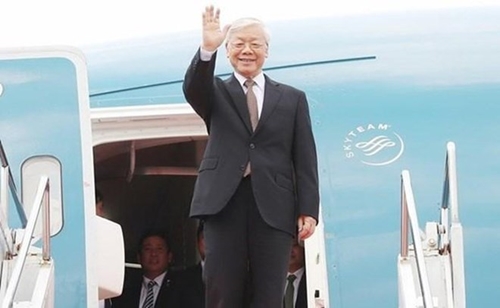Titled “Vietnam–Cambodia economic relations on solid footing,” the article was published ahead of the State visit to Cambodia by General Secretary of the Communist Party of Vietnam (CPV) Central Committee and President Nguyen Phu Trong from February 25-26.
    |
 |
|
Party General Secretary and President Nguyen Phu Trong |
It said the visit takes place as Vietnam-Cambodia ties continue to thrive, with strong emphasis on preserving, cementing and promoting relations of “good neighbourliness, traditional friendship, comprehensive cooperation and long-term sustainability” between the two countries.
Over the past years, Vietnam and Cambodia have been promoting economic cooperation and continue to maintain remarkable growth momentum in all fields, according to the article.
In 2018, bilateral trade turnover reached 4.68 billion USD, a rise of 23.2 percent compared with the same period in the previous year. In coming years, the two countries’ trade turnover is expected to continue increasing. The two sides will strive to increase bilateral trade turnover to 5 billion USD by 2020.
Regarding investment, Vietnam has about 210 investment projects in Cambodia, mostly in the fields of agriculture and forestry with a total registered investment capital of about 3.03 billion USD, putting the country in the top ten foreign direct investment providers in Cambodia.
Investment and business activities of Vietnamese enterprises in Cambodia are appreciated by Prime Minister Hun Sen and Cambodian leaders, contributing positively to Cambodia’s social welfare and prosperity.
On the other hand, Cambodia’s investment in Vietnam has also progressed positively, and so far there have been 19 projects with a total investment of 63.42 million USD.
Notably, the two countries’ cooperation and investment relations will continue to develop strongly in coming years when leaders of the two countries agree to discuss ways to match the needs of cooperation and development of Cambodia set out in the “Rectangular Strategy” with the capabilities and strengths of Vietnam.
Also, both countries will set out mechanisms and policies to create an open environment to attract more investments from Vietnamese enterprises to Cambodia, as well as encouraging more Cambodian businesses to invest in Vietnam.
In the sphere of tourism, in recent years, the tourism industry of both countries has become a sector attracting investment and human resources. In 2018, 800,000 Vietnamese visited Cambodia and Vietnam is the second largest source of tourists to Cambodia after China. Also in the same year, 203,000 Cambodian tourists came to Vietnam, making it one of the major tourism markets for Cambodia.
Vietnam and Cambodia have many favorable areas in tourism cooperation development. One of the advantages is that Vietnam Airlines currently has about 6 to 10 flights a day from Hanoi and Ho Chi Minh City to Phnom Penh and Siem Reap, creating a strong basis for connecting tourism between the two nations.
Over time, both countries have also promoted economic and transport connections to further promote each other’s strengths. A framework agreement was signed in July 2017 connecting the two economies. Negotiations have been completed for the Memorandum of Understanding on the Vietnam–Cambodia Transport Cooperation Strategy 2018 – 2025.
In April 2017, the border bridge connecting Long Binh (An Giang) with Chrey Thom (Kandal) was inaugurated. Soon, both Vietnam and Cambodia will focus on connecting transport routes, electricity, tourism, telecommunications and banking. A model border market in Da commune, Memot district, Cambodia’s Tboung Khmum province, which is adjacent to the Tan Lap border gate in Vietnam’s Tay Ninh province, is also planned. The model of a “one-stop customs clearing house” will be deployed at the Moc Bai (Vietnam) - Bavet (Cambodia) border gate.
At present, there are still untapped potential in the two countries’ economic cooperation. The prospects are great for the development of bilateral cooperation in trade, investment, tourism, agriculture and education.
Economic relations will continue to be a driving force to create a solid foundation for the relations between the two countries, the article concluded.
Source: VNA